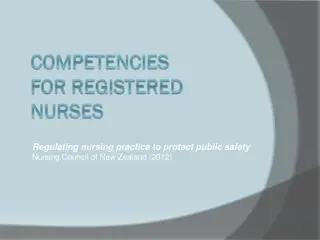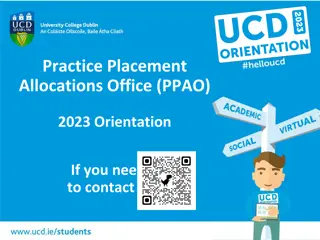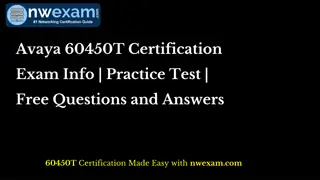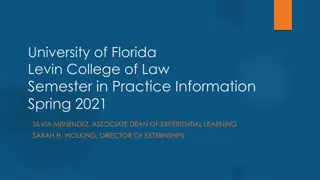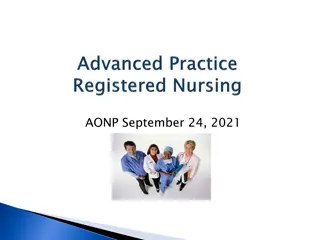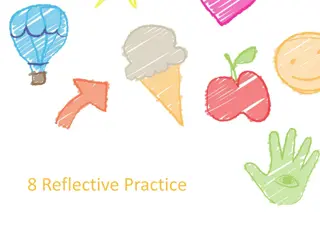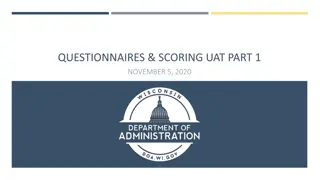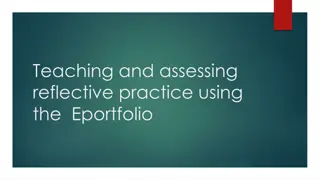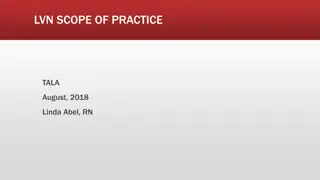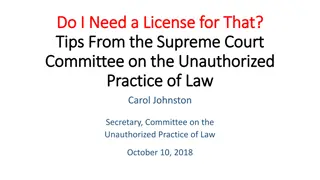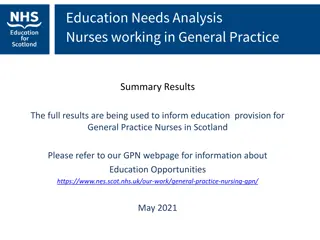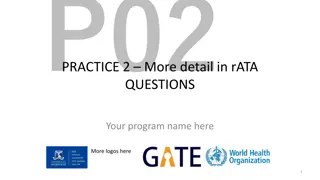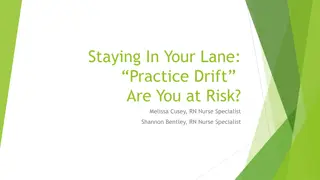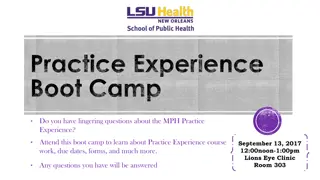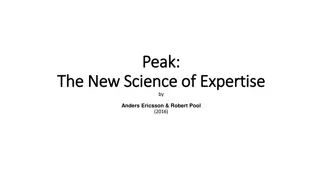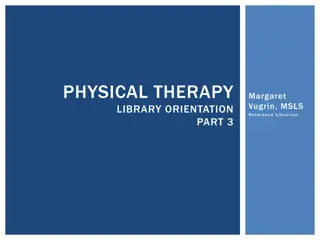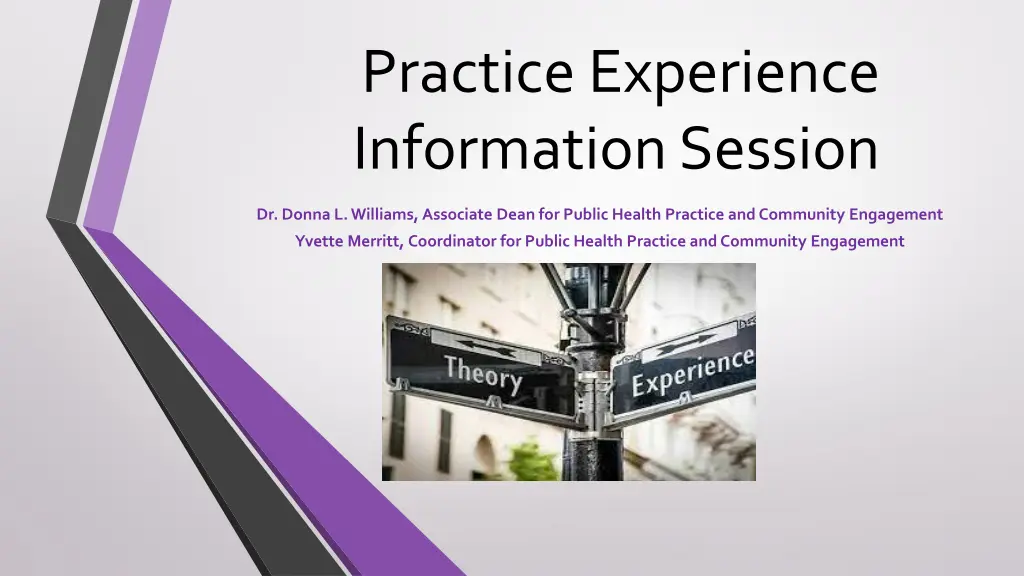
Public Health Practice Experience Guidelines
Learn about defining and planning practice experience in public health, including requirements, procedures, forms, deadlines, and the importance of bridging academic training with applied practice. Explore how practice experience helps build skills, abilities, networks, and informs career choices. Get insights into the structured, competency-driven, and supervised practice-based learning model.
Download Presentation

Please find below an Image/Link to download the presentation.
The content on the website is provided AS IS for your information and personal use only. It may not be sold, licensed, or shared on other websites without obtaining consent from the author. If you encounter any issues during the download, it is possible that the publisher has removed the file from their server.
You are allowed to download the files provided on this website for personal or commercial use, subject to the condition that they are used lawfully. All files are the property of their respective owners.
The content on the website is provided AS IS for your information and personal use only. It may not be sold, licensed, or shared on other websites without obtaining consent from the author.
E N D
Presentation Transcript
Practice Experience Information Session Dr. Donna L. Williams, Associate Dean for Public Health Practice and Community Engagement Yvette Merritt, Coordinator for Public Health Practice and Community Engagement
Defining Practice Experience Planning Procedures and Forms Deadlines Questions
Practice Experience Practice-based Learning Bridge academic training and applied public health practice. Build a professional portfolio for use during and after MPH coursework. Practice Experience The MPH Practice Experience is a project or activity that immerses the student in one or more aspects of public health operations under the guidance of a preceptor. It gives the students an opportunity to apply what they are learning in a professional public health setting, while building skills, abilities and relationships.
Defining Practice Experience Practice-based learning Bridge academic training and applied public health practice Build skills, abilities, and a professional network Inform career choices CEPH requirement Competency driven Structured Planned Supervised/mentored by preceptor Evaluated The MPH Practice Experience is a project or activity that immerses students in one or more aspects of public health operations under the guidance of a preceptor. It gives students an opportunity to apply what they are learning in a professional public health setting, while building skills, abilities and relationships. Practice Experience is not administrative, shadowing, clinical, research, or an extension of a student worker position
Practice Experience Requirements 200 practice hours| 3 Credits | 1 semester Fall & Summer 1 | Plan Prerequisites Start early! Discuss plans with advisor Speak with PE coordinator * Requirements for student starting prior to Fall 2024: At least 9 credit hours including BIOS 6100 (MPH core) OR EPID 6210 (MPH core); Program-specific core (ENHS 6238, BCHS 6212, or HPSM 6268) 2 | Identify Identify site Identify preceptor * Requirements for student starting Fall 2024: At least 10 credit hours including PUBH 6120 plus 6 credit hours of program-required coursework. 3 | Develop Work with preceptor to develop proposal * COVID Waiver 4 | Submit Submit e-forms to PE office* CITI & HIPAA Training Proposal MOU * SPH Code of Conduct * Training -HIPAA 5 | Register -CITI Get code from PE office to register for PUBH 6800 * * This course is a prerequisite for the PUBH 6600 Integrated Learning Experience
Practice Experience Planning 1. Start planning early (at least during prior semester) 2. 3. 4. The Public Health Practice Office is available to help you along the way. The didactic portion of the course will be held simultaneously with the practice experience placement Reach out with any questions at any time. *If the site is new and/or preceptor, student must submit New Site Data Form and/or submit preceptor CV/resume Identify a site and preceptor Develop your proposal Submit documents to office for approval Proposal CITI & HIPAA Training SPH Code of Conduct Preceptor Student Agreement 5. Register Registration code comes from Registrar s Office each semester and is disseminated to students once their proposal has been approved by the Practice Office
Identifying a Site Types of Placement Sites Organization, center, or program Government Non-Profit Private companies (environmental) Devoted to health of populations Prevention of disease Promotion of health Advocacy for healthcare programs/ delivery of service Additional procedures/requirements for international sites Start international PE planning early How to Find a Site Networking Advisor Peers Volunteering Email blast Approved site list on Practice Experience spreadsheet New sites must be reviewed for approval before a student can proceed New Site Data forms are on the PE webpage.
Practice Experience Preceptors Considerations for New Preceptors If the preceptor has never served in this role before, they must submit CV/resume to be reviewed for approval by PE course director. Must be an experienced, practicing public health professional MPH (or equivalent degree) plus 3 years professional public health experience Bachelor s in related field plus 5 years of professional public health experience Role of the Preceptor Orient the student to specific project goals and operational requirements Explain the structure and function of the agency Invite the student to agency, interagency, and community meetings Supervise the student Provide a model of professional work habits and attitudes Evaluate student performance on forms provided
Competency-Driven Experiential Learning MPH students are required to meet at least 5 competencies during their practice experience. 3 of 5 MUST be foundational competencies 2 of 5 MUST be program-specific competencies Selected competencies must be submitted in the Practice Experience Proposal form. Competencies must pair with a specific deliverable. Deliverables are concrete products produced during the practice experience Students must submit at least 2 deliverables to demonstrate achievement of selected competencies by the end of the practice experience.
Foundational Competencies Public Health & Health Care Systems Compare the organization, structure and function of health care, public health and regulatory systems across national and international settings Discuss the means by which structural bias, social inequities and racism undermine health and create challenges to achieving health equity at organizational, community and societal levels Planning & Management to Promote Health Assess population needs, assets and capacities that affect communities health Apply awareness of cultural values and practices to the design or implementation of public health policies or programs Design a population-based policy, program, project or intervention Explain basic principles and tools of budget and resource management Select methods to evaluate public health programs Policy in Public Health Discuss multiple dimensions of the policy-making process, including the roles of ethics and evidence 3 of 5 selected competencies must be Foundational Competencies Propose strategies to identify stakeholders and build coalitions and partnerships for influencing public health outcomes Advocate for political, social or economic policies and programs that will improve health in diverse populations Evaluate policies for their impact on public health and health equity Leadership Apply principles of leadership, governance and management, which include creating a vision, empowering others, fostering collaboration and guiding decision making Apply negotiation and mediation skills to address organizational or community challenges Communication Select communication strategies for different audiences and sectors Communicate audience-appropriate public health content, both in writing and through oral presentation Describe the importance of cultural competence in communicating public health content Interprofessional Practice Perform effectively on interprofessional teams Systems Thinking Apply systems thinking tools to a public health issue
Program Specific Competencies (Starting Fall 2024) Biostatistics and Data Science Competencies Apply principles of inferential statistics and data science to analyze various types of health-related data and decision-making. Apply hypothesis tests for public health and medical-related research questions, select appropriate statistical methods based on the study objectives and data type, and draw conclusions based on the testing results. Evaluate public health and medical studies and design suitable power analysis and sample size calculations. Apply software and programming skills for data acquisition, management, cleaning, visualization, and analysis. Apply expertise to advise researchers and public health professionals on translating research questions into testable hypotheses to advance public health. Develop skills in communication, interpretation, and presentation of research findings to collaborators or clients (Prior to Fall 2024) Biostatistics Competencies Explain the role that probability and statistical distributions play in inferential statistics and decision-making. Advise researchers and public health professionals on translating research questions into testable hypotheses to advance public health. Prepare appropriate analytic approaches for public health research questions, use corresponding statistical methods to test null hypotheses, and draw conclusions based on the testing results Selectively apply hypothesis tests for comparing treatment strategies and exposure groups appropriate to the type of response measurement (e.g., binary, ordinal, continuous) Perform power analysis and sample size calculations to aid in the planning of public health studies. Communicate to colleagues and clients the assumptions, limitations, and (dis)advantages of commonly used statistical methods and describe preferred methodological alternatives when assumptions are not met. Use computer software for acquisition, management, analysis of data, and presentation of results.
Program Specific Competencies (Starting Fall 2024) Community Health Science and Policy Competencies Identify and apply behavioral health theories, concepts and models to community health analyses and practice. Analyze the impact of community practice interventions on public health, social justice, health promotion, and/or economic opportunity. Demonstrate proficiency in planning, implementation and evaluation of ethical and culturally aligned public health programs, policies, and/or interventions. Apply management practices to decision-making in public health. Develop, analyze, and/or evaluate policies for improving the health status of populations. Identify socio-ecological factors and potential solutions affecting the health of individuals and populations, including health disparities. (Prior to Fall 2024) Behavioral and Community Health Sciences Competencies Prioritize individual, organizational and community concerns, assets, resources and deficits for social and behavioral science interventions and policy change. Analyze the role of individual, social and community factors in both the onset and solution of public health problems through intervention or policy change. Design, implement, and interpret program evaluation methods to assess and improve community health programs and/or policies Understand and apply public health methods across multiple levels of influence, specifically using the Social Ecological Model Translate research to public health practice and policy Apply evidence-based public health approaches to examine and respond to behavioral and community health issues in Louisiana
Program Specific Competencies (Starting Fall 2024) Environmental Health, Climate and Sustainability Competencies Identify and assess health impacts of environmental hazards. Appraise and communicate the science on climate change and sustainable solutions. Develop and evaluate policies to equitably address hazards and risks. Analyze and interpret data related to hazards, risks and impacts. Facilitate resilience and adaptation through geospatial planning to address vulnerabilities and risks. (Prior to Fall 2024) Environmental and Occupational Health Sciences Competencies Collect, analyze, and interpret environmental and occupational health outcomes data. Examine the direct and indirect human, ecological, and safety effects of environmental and occupational exposures in order to protect the health of workers and the public. Evaluate biological, genetic, physiological, and psychological factors that affect human susceptibility to adverse health outcomes following exposures to environmental and occupational health hazards. Select appropriate human health risk assessment methods for a variety environmental and occupational data. Recommend corrective strategies for mitigating and preventing environmental and occupational exposures that pose human health and safety risks. Apply knowledge of federal and state regulatory programs, guidelines, and authorities appropriate to environmental and occupational health and safety.
Program Specific Competencies (Starting Fall 2024) Epidemiology and Population Health Competencies Critique the processes involved in the design, analysis and evaluation of an epidemiologic study. Distinguish the major sources of bias in epidemiology research and literature and the ways to evaluate and reduce the bias. Apply and perform epidemiologic analyses using linear, logistic, Cox and Poisson regression using a standard statistical package (e.g. SAS, R, or STATA). Evaluate data for confounding and effect modification (interaction) applying the tools of causal inference in epidemiology. Effectively communicate epidemiologic information to diverse audiences in diverse settings. Apply evidence-based management practices and quality improvement concepts to address health care organization and delivery issues. Analyze the impact of political, social, and economic policies on health systems at the local, state, national, and international levels and formulate solutions to key problems. (Prior to Fall 2024) Epidemiology Competencies Critique the processes involved in the design, analysis and evaluation of an epidemiologic study. Distinguish the major sources of bias in epidemiologic research and the ways to evaluate and reduce the bias. Apply epidemiologic analyses using linear, logistic, Cox and Poisson regression. Evaluate data for confounding and effect modification (interaction) Apply the tools of causal inference in epidemiology (e.g., counterfactuals, directed acyclic graphs) Appraise the strengths and weaknesses of epidemiologic literature Effectively communicate epidemiologic information to diverse audiences in diverse settings.
Deliverables Products Mapping Deliverables "products" will be submitted at the end of the semester and added to student's portfolio. Use competencies selected on pages 2-4 Deliverables are tangible and functional products or a service that the organization can adopt Activities that support the creation and completion of products for the organization's use Multiple competencies can be associated with one deliverable product.
Procedures and Forms All Required Forms are due via Email to the PE Coordinator Summer 2024 (due 3/26/2025), Fall 2024 (due 6/18/2025) Proposal* Signed by student, preceptor, and PE course director Submit a draft proposal to the PE coordinator to review prior to obtaining a signature from your preceptor Meet with the PE office to discuss the proposal before approval Preceptor Student Agreement* Defines roles and responsibilities of student and preceptor Must be signed by the student and preceptor New Site Data form for new sites* CV/resume for new preceptors **No late forms accepted and no extensions permitted** *Forms are on the PE webpage **Accommodations are made for students awaiting formal internships
Integration with Culminating Experience (PUBH 6600) Beginning in Summer 2025, The separate courses of the Practice Experience (PUBH 6800) and Culminating Experience (PUBH 6600) will be linked to provide continuation of service to our community partners by the students and provide more individualized experiences. The primary shift in this process is with the Culminating Experience building on the work done during the Practice Experience. The competency-based approach to both the Practice Experience and Culminating Experience courses: Practice Experience - students self-select at least five competencies, of which three must be foundational competencies Culminating Experience - students must demonstrate attainment of at least three competencies, one core competency is chosen by the Course Director Students must also choose at least one concentration competency to demonstrate. 14. Advocate for political, social or economic policies and programs that will improve health in diverse populations 15. Evaluate policies for their impact on public health and health equity 22. Apply systems thinking tools to a public health issue Deliverables for the Practice Experience should be developed with an eye for how they will be integrated into the final product for the Culminating Experience. The final paper and presentation for the Culminating Experience is expected to be built around the work done during the Practice Experience, specifically addressing the issues and population identified during that work. Preceptors will be also invited to the final presentations and receive a copy of the final paper of the student affiliated with their site at the conclusion of the Culminating Experience course.
Integration with Culminating Experience (PUBH 6600) Upon successful completion of the Practice Experience, students will then be allowed to register for the Culminating Experience. The course director for the Culminating Experience will be provided the list of qualifying students with their site location, preceptor and deliverables at the end of each semester the Practice Experience is offered.
Practice Experience Resources http://sph.lsuhsc.edu/resources/student-resources/practice-experience/ Handbook Active Placement Site List Forms Public Health Practice and Community Engagement Office Room 220 Email publichealthpractice@lsuhsc.edu Phone 504-568-5874



